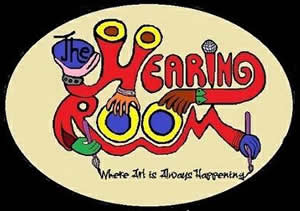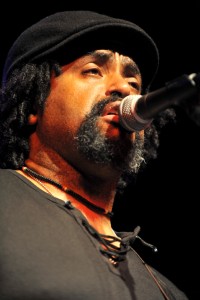 Thaddeus Hogarth has been on the greater-Boston music scene for about 25 years now. Despite his ever increasing opportunities and visibility, he’s always kept his focus on the joy of playing music.
Thaddeus Hogarth has been on the greater-Boston music scene for about 25 years now. Despite his ever increasing opportunities and visibility, he’s always kept his focus on the joy of playing music.
Most of what Hogarth focuses on is his power trio, Thaddeus Hogarth Band, with drummer Tony “Thunder” Smith (who has played with Lou Reed, John McLaughlin, Jan Hammer) and bassist David Buda who has also been included on many CDs from many artists. Hogarth also recently released a Jimi Hendrix inspired album called Tribute that features Hogarth’s trio project playing R&B versions of Jimi Hendrix songs, and they’ve played several shows to promote that recording.
Additionally, Hogarth has in the works an original music CD with David Buda and drummer Kenwood Dennard. Hogarth and his power trio are also gearing up to record a live album at Chianti’s in Beverly, Massachusetts.
“My goal as a writer and as an artist is to be prolific,” Hogarth said. “People are saying, these days, that people are not buying CDs, yada, yada, yada, The truth is, every time I play a show, everybody wants to take home a CD. I think on the indie level, CDs are alive and well. When someone sees an artist, they instantly want to take one. They want to take home some of the music.”
To spread the joy of music and to share his guitar techniques, Hogarth has been teaching at Berklee College Of Music for the last 18 years, teaching in the guitar department of the school and in the online version of the college. His instruction focuses on all of the performance aspects of the guitar. Some of his classes are private lessons. Some are ensemble groups of guitar students. Some are labs which are groups of guitar students, and mix ensembles which are for guitars and other instruments.
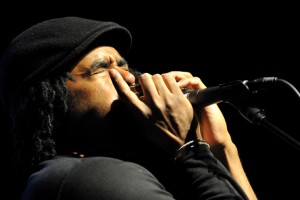 “It is the ultimate reward,” Hogarth said of teaching. “I started as a kid getting a buzz from this progression of notes and hearing these sounds. I’m not a musician because I want to be famous or I’m in the love with the lifestyle of musicians. The rewards of teaching stem right back to the joys that I experienced when I was an early student of the guitar.”
“It is the ultimate reward,” Hogarth said of teaching. “I started as a kid getting a buzz from this progression of notes and hearing these sounds. I’m not a musician because I want to be famous or I’m in the love with the lifestyle of musicians. The rewards of teaching stem right back to the joys that I experienced when I was an early student of the guitar.”
Hogarth said that musicians get tired of the music business, dealing with agents, talent buyers, club owners, tour managers, and road managers., They get o far removed from the music, that they start to wonder why they got involved with it to begin with. “What teaching does for me, it keeps the joy at the forefront,” he said. “I’m dealing with people that are passionate about what they’re learning, and I’m teaching it to them, and I’m getting as much from it as they are.”
Hogarth also finds that teaching is a path to seeing things in new ways and interpreting things in new ways. He can recall a point in his career when he felt he was hitting a ceiling and wasn’t improving. Yet, when he went back to reinforce the basics by teaching, he was able to move forward.
“I became a much better musician because knowing it well enough to deliver it is one thing, it’s another thing to know it well enough to teach it. You have to know it ten times as well.”
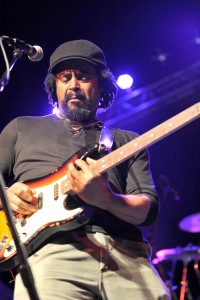 Hogarth has an interesting life story. He was born in the United Kingdom then he was raised in the West Indies from age 11 to 21. It’s a common demographic in the United Kingdom, as a wave of immigrants left the West Indies after the second world war for education and employment opportunities. “When I was 11 years old when my parents split up, and my mother took us back to St. Kitts,” he said. “I grew up in St. Kitts from 11 to 21. I went to high school there. I started playing in bands in hotels there.”
Hogarth has an interesting life story. He was born in the United Kingdom then he was raised in the West Indies from age 11 to 21. It’s a common demographic in the United Kingdom, as a wave of immigrants left the West Indies after the second world war for education and employment opportunities. “When I was 11 years old when my parents split up, and my mother took us back to St. Kitts,” he said. “I grew up in St. Kitts from 11 to 21. I went to high school there. I started playing in bands in hotels there.”
Back in his school days in St. Kitts, radio only played a song once a day. The radio stations there didn’t play a song over and over again, every few hours, like radio stations in the United States. The West Indies also had only a limited amount of radio stations. Growing up, not having access to recording devices, Hogarth only had from the time the song started until it ended to learn it.
“I wasn’t going to hear it again for another day,” he said. “You pick up the guitar and you run to the radio and you try to pick up as many sounds and chords as you could that time around and maybe you’d catch it later that day,” he said. “That was my whole ear training thing back then.”
Hogarth listened to a lot of soul, blues, R&B, funk, and horn bands while living on a small island where that music was valued and treasured. Whenever Hogarth or one his childhood friends bought a record, they would play it over and over again the whole day, jamming along to it.
“I think I got my first cassette player when I was 15 or 16 or something like that,” he said. “I was then actually able to record something and rewind it and repeat it,” Hogarth said.” Getting closer to adulthood, Hogarth discovered jazz when he heard a West Montgomery records. “It just blew me away,” he said. “What kind of soloing is this? It sounds like chords when you’re soloing. I could hear the progression.”
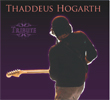 Growing up in the islands exposed Hogarth to Bob Marley, which put the idea in his head that artist sang about real things, social change, and making the world a better place. From there, Hogarth got into Marvin Gaye, Curtis Mayfield, and other 1970s soul artists.
Growing up in the islands exposed Hogarth to Bob Marley, which put the idea in his head that artist sang about real things, social change, and making the world a better place. From there, Hogarth got into Marvin Gaye, Curtis Mayfield, and other 1970s soul artists.
“I used to listen to American Top 40 on the radio every Sunday,” he said. “You’d hear a Santana song followed by a Stylistics songs. It wasn’t as pocketed as genres are today. It was a great time playing in the hotels, playing for the tourists, playing bossanovas, and playing disco. I was exposed to a lot of stuff..”
For Hogarth, R&B, soul, and funk is what he calls the people’s music, describing it as undeniably, universally connecting. That perception has followed Hogarth to his present day. Occasionally, he and a musician friend will take their acoustic guitars to a park and start singing old soul tunes by Smokey Robinson and others from that era.
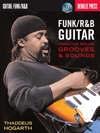 “Within five or six songs, we’ve got 20 people sitting around singing along,” he said. “If we sing some Bob Marley tunes and some reggae tunes, there’s an instant connection with the population. You’ve got people that a put out a blanket. Next thing you know, you’ve got a concert going.”
“Within five or six songs, we’ve got 20 people sitting around singing along,” he said. “If we sing some Bob Marley tunes and some reggae tunes, there’s an instant connection with the population. You’ve got people that a put out a blanket. Next thing you know, you’ve got a concert going.”
During the 1990s, Hogarth was the lead singer, guitarist, and primary songwriter for the local Boston sensation Heavy Metal Horns. He wrote a few of the sing along anthems. “It might not have been that deep but that just came from that whole idea of connecting with people and singing something that makes them connect in an emotional and a visceral way,” he said.
Hogarth has accumulated many honors and recognition over the decades. He has also been featured in many national music magazines. Yet, none of those articles ever peer into what motivates the man to explore his instrument so deeply and intensely. Hogarth said that for him it’s all about expression. More important to him than any instrument is the voice because it is so expressive. After the voice, he puts the guitar is at the top of his list.
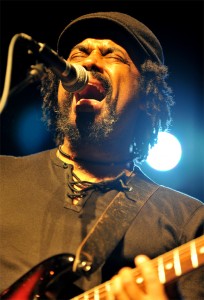 “The tones that are possible with electric guitar get about as vocal as you can get with vocals,” he said. “The different tones you can get from your fingers alone, I am always amazed. They’re not even using a pick. It’s just a different way of playing and something about the magic they can speak through their fingers alone I’ve always found fascinated. One person can pick up a guitar and another person can pick up the same guitar, and you hear two different languages coming from this instrument. Not to mention the myriad of effects you can use, such as wah-wah. Usually, I’m more especially attracted to the vocal effect, wah-wah, the envelope filter. For me, my journey with the guitar has always been trying to find new sounds that emulate some kind of vocal quality.”
“The tones that are possible with electric guitar get about as vocal as you can get with vocals,” he said. “The different tones you can get from your fingers alone, I am always amazed. They’re not even using a pick. It’s just a different way of playing and something about the magic they can speak through their fingers alone I’ve always found fascinated. One person can pick up a guitar and another person can pick up the same guitar, and you hear two different languages coming from this instrument. Not to mention the myriad of effects you can use, such as wah-wah. Usually, I’m more especially attracted to the vocal effect, wah-wah, the envelope filter. For me, my journey with the guitar has always been trying to find new sounds that emulate some kind of vocal quality.”
Hogarth also plays harmonica, on which he’s heavily influenced by Stevie Wonder. The harmonica is important to him because wind is an instrument that emulates vocal quality. “There’s times when I hear Stevie Wonder play harmonica and I get goose bumps from a solo the same way I do on guitar,” he said. “I don’t get it that much on other instruments. It’s not that I don’t’ love them and appreciate the sound, but for me, there’s something about the guitar that’s on the top of the list. What drives me is that it can communicate so much with in just a few notes.”
Hogarth said that with guitarists like B.B. King, Jimi Hendrix, and Carlos Santana, they can play just one note and listeners feel an emotional response.
Hogarth likes funk bands that took the guitar from a background instrument in a rhythm section and put it up front to let it shine. Parliament Funkadelic is one that stands out in his collection. “Thanks to that, cats like me can be center stage with my guitar, and it can be a feature. You can draw people in and make them listen to your song. Jimi Hendrix was an amazing songwriter, and there’s so many people who don’t know that. But his guitar drags people in and gets them to start listening to his lyrics.”
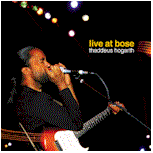 Hogarth pointed out that he could be in a club where people are not listening, and he only needs to turn the guitar up. Using a wah-wah pedal can also grab people’s attention. “People turn around and say ‘Yeah, make that guitar talk, man. Make that guitar talk.’ There’s this wonderful romantic attraction the general public has for that.”
Hogarth pointed out that he could be in a club where people are not listening, and he only needs to turn the guitar up. Using a wah-wah pedal can also grab people’s attention. “People turn around and say ‘Yeah, make that guitar talk, man. Make that guitar talk.’ There’s this wonderful romantic attraction the general public has for that.”
Hogarth’s intense interest in guitar related equipment eventually resulted in an invitation from Bose to work on their L1 amplification system or Personal Amplification System. It amplifies sound with a cylindrical radiating speaker system. Whenever you are in a room, when you have line of sight of the system, you hear it the same as anyone else within line of sight. Bose chose Hogarth and 23 other acts from across the country to be the bands to deliver the sound with this amplifier. Hogarth was also the first musician to record a live album using this system, which happened at Bose’s theater in Framingham, Massachusetts.
“I had a meeting with Bose and they played the recording and they said ‘This is absolutely amazing. We want to be a part of this,’’ Hogarth recounted. “They released Live At Bose the CD, and they had it all over the world. Wherever they sold the L1 System, they were using my CD to sell the system, and the CD won an award. It was the Independent Music Award, which is an international award. So, it was like having a record deal without having a record deal because my record was all over the place, and so was my image for a while.”
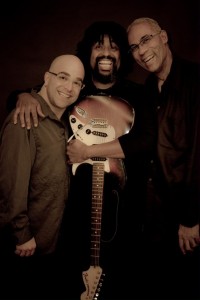 Becoming an almost famous, international rock star through the Bose marketing machine didn’t even phase Hogarth. His prime directive, since graduating from Berklee in 1988, has been to focus on his music. He is fascinated by musicians like Steely Dan who could walk down the street without being recognized because their marketing focuses on their music, not on them.
Becoming an almost famous, international rock star through the Bose marketing machine didn’t even phase Hogarth. His prime directive, since graduating from Berklee in 1988, has been to focus on his music. He is fascinated by musicians like Steely Dan who could walk down the street without being recognized because their marketing focuses on their music, not on them.
“It wasn’t so much that I was getting all this publicity as much as it was many people getting to hear my music,” he said. “I woke up this morning, and I turned on my phone. It must happened to be on Facebook from last night, and the first thing I saw was someone quoting a lyric from one of my songs on Facebook. He copied me on it. He’s a rapper. I was like ‘Dude, you made my day. You’re quoting lyrics from my song.’ The second thing I saw was someone else who said they found my music on some other sharing thing. That to me is the main reason” why he appreciates the publicity.
Hogarth said he doesn’t want to diss music sharing sites like Spotify or Itunes, but he isn’t crazy about those music sites because he doubts that the artist is getting paid each time the music is shared. He would rather see more artists selling their CD products at their shows or on their own websites in a grass roots marketing campaign, like farmers selling their produce at farmers markets.
“I’d love to see more of the same thing happening on the music level,” he said. “Download my music, please, from my site because I will take all of the downloading fees, and I’ll be able to do another record next year and the year after. But, if you buy my stuff from XYZ out here, hey, I’m never going to get paid for it. If I do, it’s going to be like 40 percent for this. 10 percent for that, 5 percent for that. I’d be back into the same model that the old labels used to do. You could have a hit record and still be poor. How many times have we heard that story of the artist who never got paid for a record that sold millions but the record execs have their three islands off the coast of this country or that country.”
While not a current fan of technically adept bands like Rush, Cream, and King Crimson, Hogarth appreciates the virtuosic players. “It’s people out there pursuing the highest level of their art. I think that that in and of itself is a noble thing,” he said. “It’s not settling for where you are but really trying to expand and get to a higher level. I think it’s beautiful. A lot of my students are into band like that. While as a guitarist, it might not be my personal choice for who I would like to be in my CD change, I totally respect their virtuosity and their attention to detail and their commitment to the highest level of their art.”
Aside from his guitar work, technical work, and teaching, Hogarth has written a book about R&B music, and he has done voiceovers of Marcus Garvey and Fredrick Douglas for PBS, who had had worked for after graduating college. He has also been an actor in stage productions.
“I always come back to me music,” he said. “For me, music is a much more direct way of communicating with people.”
On October 10th Hogarth’s trio will perform the Jimi Hendrix tribute at Studio G in Plymouth, Massachusetts.
On October 17th, Hogarth will perform his original music at Ryles in Cambridge, Massachusetts.

